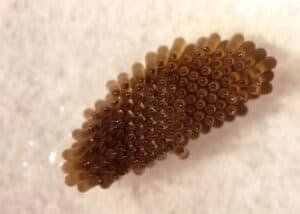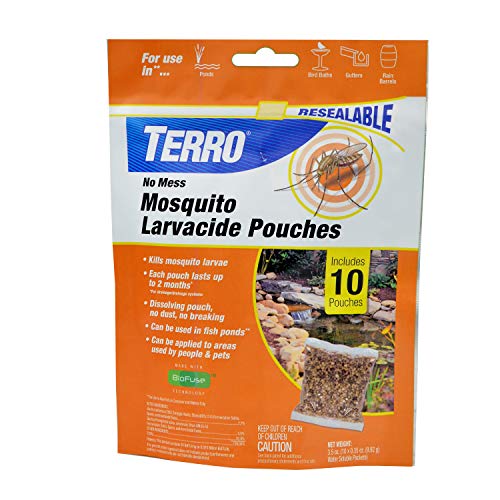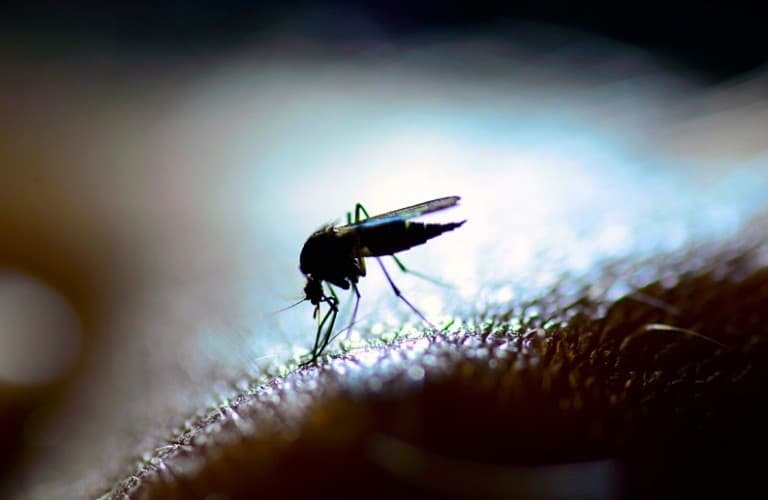Just about everyone has had to contend with a swarm of mosquitoes, but many are not aware of the process behind the emergence of these little pests; specifically, where they often lay their eggs.
Where do mosquitoes lay eggs? Not all species lay eggs directly on water’s surface. Species of standing-water mosquitoes tend to lay their eggs in or near standing or stagnant pools of water. Floodwater mosquitoes, however, prefer to lay their eggs in lowland areas with wet or damp soil.
A keen understanding of a mosquito’s reproductive process is essential for a successful pest control campaign. If you want to keep adult mosquitoes from taking over your yard, read on to learn more about where they lay their eggs and how to prevent them from ending up on your property.
Check with our article “How To Get Rid of Mosquitoes” for a complete guide and recommended products for ridding your home and yard of these pesky pests.
Mosquito Eggs
As you can probably imagine, mosquito eggs aren’t exactly easy to spot. You have to know where to look, when to look, and what to look for.
Mosquito eggs are laid together in a “raft” that floats atop the surface of the water. This raft looks a lot like a dark speck of dirt and has also been compared to a piece of soot. The eggs are about 1/4 inch long and 1/8 inch wide. If you take out a ruler and look at how small this actually is, you will understand how difficult it can be to hunt down mosquito eggs with the naked eye.
What makes things even more difficult is that some mosquito species lay eggs individually rather than in a raft.
After hatching, the baby mosquitoes enter the larval stage, taking on the appearance of small, hairy worms less than a quarter-inch long with rounded heads. They have siphon tubes much like a snorkel located at the ends of their abdomens used to breathe while in the water.
What Time of Year Do Mosquitoes Lay Eggs?
In temperate climates (places that experience cold winters), the vast majority of mosquito activity occurs during summer. Mosquitoes require a blood meal to lay their eggs, so naturally they will have less opportunity to repopulate during colder months of the year. They are unfortunately capable of laying eggs even in frozen water.
The good news is that mosquitoes go dormant once the temperature is consistently below 50 degrees Fahrenheit.
If you happen to live in a warmer and humid climate, mosquitoes will be able to lay their eggs year-round. Thus, predicting peak breeding times can be more of a challenge in places like South Florida and bites will be common throughout the year.
(Can mosquitoes bite through clothing? Find the answer here.)
The apex of the mosquito population boom tends to occur during the wettest time of the year in tropical or subtropical areas. Flooding events can awaken floodwater mosquitoes that lay their eggs in moist soil, and the arrival of water is the cue for the eggs to begin hatching.
Using mosquito-repelling candles can help you fend off these terribly annoying pests and enjoy the outdoors again. In this article, we show you which candles are best to use outdoors and which are suitable for indoor use as well.
Where Will You Find Mosquito Eggs?
Since mosquito eggs are very small, they can be found just about anywhere where there is a little bit of stagnant water:
- Ponds
- Low spots where water collects
- Stream eddies
- Puddles
- Water-filled buckets
- Even the few drops of condensation in a tire!
Some mosquito species can puncture plant cells to lay their eggs. In this environment, the developing larvae can access oxygen without being under the threat of predation. In these cases, it’s virtually impossible to spot the developing mosquitoes – you are probably more likely to find the larva or pupa of mosquitoes than you are to find the eggs.
The eggs can hatch within just a few days of being laid, although they can also sit still for several months until the right conditions for hatching arrive.
Can Mosquitoes Lay Eggs Without Water?
A mosquito’s reproduction strategy will vary by species. Many types of mosquitoes do indeed require standing water to lay their eggs. However, some species, like floodwater mosquitoes, lay their eggs in areas that have moist soil but not water.
Research recently performed in Canada suggests that most mosquito species do not lay their eggs directly in water. The study found that as many as 60% of mosquito species do not lay their eggs on the water’s surface; instead, they lay the eggs in an area near the water.
Generally, it appears that mosquito eggs do at least need to be located relatively close to a water source to survive. This can undoubtedly help you identify potential breeding grounds where you can maximize your mosquito control efforts.
How Long Before Mosquitoes Eggs Hatch?
An adult female mosquito’s average lifespan is about 14 days, but some can live for up to a month. During that time frame, she may be able to lay as many as 100-200 eggs on three separate occasions.
These eggs will not necessarily hatch until they have become inundated with water.
Mosquitoes have a keen sense for finding suitable breeding grounds. Water does not have to be sitting out for very long for mosquitoes to take notice; roughly seven days is typical.
This figure highlights the importance for homeowners to prevent these breeding grounds from popping up in the first place.
Also of importance is the time it takes for a mosquito to reach adulthood.
Mosquito Life Cycle
Mosquitoes, as is generally the case with insect pests, reach adulthood pretty quickly. This is why they seem to appear instantly after a long-awaited rain event.
Understanding the life cycle of the mosquito is an instrumental part of pest control.
- Eggs – can hatch within three days if conditions are right; otherwise, they can wait for water for several months.
- Larvae – can develop into pupae in as little as five days.
- Pupae – grow into flying adults in two to three days.
- Adult – this is the stage where mosquitoes reproduce; only adult females bite.
How to Prevent Mosquitoes from Laying Eggs
Mosquito control is difficult because they do not need very much water at all to thrive and reproduce.
This is why populations skyrocket during the wet summer months.
Fortunately, there are many approaches that you can take to ensure that the population is kept in check so that you can get back to enjoying your yard during the summer:
- Don’t give mosquitoes what they want – Avoid creating mosquito breeding grounds. Don’t leave buckets or containers in areas where they may collect rainwater. Keep your property clean and orderly.
- Routinely clean your pool if you have one – You should also run your water filter often and use a pool cover to prevent the pool from becoming a mosquito breeding ground.
- Keep rain barrels covered – Standing water is an invitation to mosquitoes. Keep a tight lid on barrels, especially during times of dry weather.
- Routinely cut your lawn and trim brushes – Mosquitoes prefer uncontrolled vegetation over a tidy yard. (Learn where they like to hide here.)
If your yard has become overtaken by swarms of mosquitoes, then more advanced pest control methods may be necessary.
There are various mosquito control products available on the market, such as Terro Mosquito Larvacide Pouches.
These dissolvable pouches can be added to stagnant water areas such as birdbaths, fish ponds, and rain barrels.
The pouches contain a selective microbial insecticide safe for application in areas with children, pets, and other wildlife.
Mosquitoes are attracted to certain colors, heat, carbon dioxide, and specific types of light (learn more here).
Using a mosquito trap that utilizes heat from UV light, pulse-width modulation, and a mosquito-attracting color will target adults and thus reduce the number of eggs.
- Katchy has a good version for indoor use,
- FVOIA has a zapper for outdoor use
- This slightly more expensive model can handle both indoor and outdoor environments.
Final Thoughts
Mosquito populations are challenging to control because of how rapidly they become full-fledged adults always on the hunt for more food for their developing young.
It’s a vicious cycle that can be broken with a few careful preventative actions:
- Keep your yard clean and free of anything that would hold stagnant water (even tires can hold enough water for mosquito eggs).
- Clean and cover pools when they’re not in use.
- Consider purchasing larvacide pouches that safely curtail the population boom.
- Ensure that your lawn is kept tidy and bushes are trimmed back as necessary.
Don’t miss out on key prevention practices, elimination strategies, and the best products for mosquito control. Click here to see all of our mosquito articles.
Sources:
- http://www2.clarku.edu/~tlivdahl/back/index.html
- https://www.vdci.net/mosquito-biology-101-life-cycle/
- https://www.mosquitoauthority.ca/blog/2018/08/02/how-do-mosquitoes-survive-the-winter/
- https://miami.cbslocal.com/2020/05/29/mosquito-season-south-florida/
- https://edis.ifas.ufl.edu/in535
- https://www.cbc.ca/news/technology/mosquito-eggs-water-1.4069272
- https://www.cdc.gov/dengue/resources/factsheets/mosquitolifecyclefinal.pdf
- https://www.terro.com/terro-mosquito-larvacide-pouches






